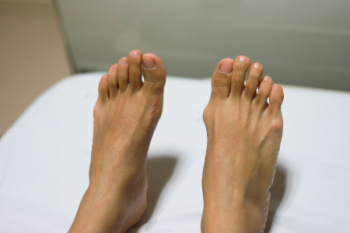 Bunions are a common foot problem, particularly prevalent among women. These bony bumps form on the joint at the base of the big toe, causing the big toe to lean towards the others. They develop due to genetic factors, foot structure, and wearing tight or ill-fitting shoes. Conditions such as arthritis can also contribute to bunion formation. Bunions can cause significant discomfort, including pain, swelling, and redness surrounding the affected joint. The skin over the bunion may become thickened and sore, making it difficult to walk or wear certain shoes, and often leading to embarrassment when wearing open-toe shoes. Caring for bunions involves wearing comfortable, well-fitting shoes with ample toe space, and avoiding high heels. Using padded shoe inserts or bunion pads can alleviate pressure and reduce pain. Taking pain relievers can help manage symptoms. In severe cases, bunions can lead to arthritis, and surgery may be necessary to correct the deformity. For persistent pain or severe bunions, it is suggested that you visit a podiatrist for professional treatment options.
Bunions are a common foot problem, particularly prevalent among women. These bony bumps form on the joint at the base of the big toe, causing the big toe to lean towards the others. They develop due to genetic factors, foot structure, and wearing tight or ill-fitting shoes. Conditions such as arthritis can also contribute to bunion formation. Bunions can cause significant discomfort, including pain, swelling, and redness surrounding the affected joint. The skin over the bunion may become thickened and sore, making it difficult to walk or wear certain shoes, and often leading to embarrassment when wearing open-toe shoes. Caring for bunions involves wearing comfortable, well-fitting shoes with ample toe space, and avoiding high heels. Using padded shoe inserts or bunion pads can alleviate pressure and reduce pain. Taking pain relievers can help manage symptoms. In severe cases, bunions can lead to arthritis, and surgery may be necessary to correct the deformity. For persistent pain or severe bunions, it is suggested that you visit a podiatrist for professional treatment options.
If you are suffering from bunions, contact one of the podiatrists of JE Foot & Ankle Associates. Our doctors can provide the care you need to keep you pain-free and on your feet.
What Is a Bunion?
A bunion is formed of swollen tissue or an enlargement of boney growth, usually located at the base joint of the toe that connects to the foot. The swelling occurs due to the bones in the big toe shifting inward, which impacts the other toes of the foot. This causes the area around the base of the big toe to become inflamed and painful.
Why Do Bunions Form?
Genetics – Susceptibility to bunions are often hereditary
Stress on the feet – Poorly fitted and uncomfortable footwear that places stress on feet, such as heels, can worsen existing bunions
How Are Bunions Diagnosed?
Doctors often perform two tests – blood tests and x-rays – when trying to diagnose bunions, especially in the early stages of development. Blood tests help determine if the foot pain is being caused by something else, such as arthritis, while x-rays provide a clear picture of your bone structure to your doctor.
How Are Bunions Treated?
- Refrain from wearing heels or similar shoes that cause discomfort
- Select wider shoes that can provide more comfort and reduce pain
- Anti-inflammatory and pain management drugs
- Orthotics or foot inserts
- Surgery
If you have any questions, please feel free to contact one of our offices located in Fleming Island and Palm Coast, FL . We offer the newest diagnostic and treatment technologies for all your foot care needs.
